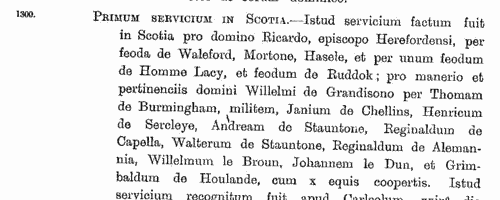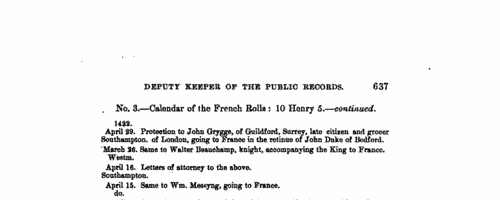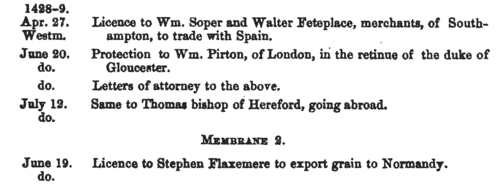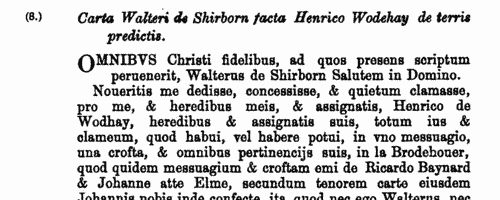Langford Surname Ancestry ResultsOur indexes 1000-1999 include entries for the spelling 'langford'. In the period you have requested, we have the following 863 records (displaying 1 to 10): Single Surname Subscription | | | Buying all 863 results of this search individually would cost £4,786.00. But you can have free access to all 863 records for a year, to view, to save and print, for £100. Save £4,686.00. More... |
These sample scans are from the original record. You will get scans of the full pages or articles where the surname you searched for has been found. Your web browser may prevent the sample windows from opening; in this case please change your browser settings to allow pop-up windows from this site. Close Rolls (1234-1237)
The close rolls of the 19th to 21st years of the reign of king Henry III, that is from 28 October 1234 to 27 October 1237, record the main artery of government administration in England, the orders sent out day by day to individual officers, especially sheriffs of shires: they are an exceptionally rich source for so early a period. Most of the contents relate to England, but there are also entries concerning Wales, Scotland, Ireland and the English possessions in France. This calendar was prepared by staff of the Public Record Office and published in 1908. Latin.
LANGFORD. Cost: £6.00.  | Sample scan, click to enlarge

| Patent Rolls: entries for Wiltshire
(1279-1280)
Calendars of the patent rolls of the reign of king Edward I are printed in the Calendars of State Papers: but these cover only a fraction of the material on the rolls. From 1881 to 1889 the reports of the Deputy Keeper of the Public Record Office also include calendars of other material from the rolls - about five times as many entries as in the State Papers - predominantly mandates to the royal justices to hold sessions of oyer and terminer to resolve cases arising locally; but also other general business. The calendar for the 8th year of king Edward I [20 November 1279 to 19 November 1280], hitherto unindexed, is covered here.LANGFORD. Cost: £6.00.  | Sample scan, click to enlarge

| Clerks and Clergy in Herefordshire, Shropshire and Gloucestershire, Berkshire, Dorset and Wiltshire
(1283-1317)
The register of bishop Richard de Swinfield of Hereford, containing general diocesan business. Hereford diocese covered almost all Herefordshire, southern rural Shropshire, a westward arm of Worcestershire, and a northwestern slice of Gloucestershire. The register also includes ordinations from the diocese of Salisbury (then covering Berkshire, Dorset and Wiltshire) for 1284-1291.LANGFORD. Cost: £6.00.  | Sample scan, click to enlarge

| Grantees of offices, commissions and pardons
(1350-1354)
The Patent Rolls are the Chancery enrolments of royal letters patent. Those for the 24th to the 27th years of the reign of king Edward III (25 January 1350 to 24 January 1354) were edited for the Public Record Office by R. F. Isaacson, and published in 1907. The main contents are royal commissions and grants; ratifications of ecclesiastical estates; writs of aid to royal servants and purveyors; and pardons. LANGFORD. Cost: £2.00.  | Sample scan, click to enlarge

| Clergy, the religious and the faithful in Britain and Ireland
(1342-1362)
These are abstracts of the entries relating to Great Britain and Ireland from the Regesta of popes Clement VI and Innocent VI, from the period when the papal court was resident at Avignon. Many of these entries relate to clerical appointments and disputes, but there are also indults to devout laymen and women for portable altars, remission of sins, &c. This source is particularly valuable for Ireland, for which many of the key government records of this period are lost. Clement VI was consecrated and crowned 19 May 1342 (the day from which his pontificate is dated); Innocent VI was crowned 18 December 1352 and died 12 September 1362. The extracts were made by W. H. Bliss and C. Johnson from Regesta cxxxvii to ccxliv, and published in 1897. The registers are almost complete for these two pontificates. At his accession, Clement VI promised to grant benefices to all poor clerks who should come to Avignon and claim them within two months of his coronation. As many as 100,000 are said to have come, and the register for the first year of his pontificate runs to twelve volumes.LANGFORD. Cost: £4.00.  | Sample scan, click to enlarge

| Payments by the English crown
(1370)
The Exitus or Issue Roll of the Exchequer, compiled by the Clerk of the Pell, recorded all issues or payments made by the English crown: presents of plate and jewellery to foreign nobility; household payments to officers and servants; wardrobe payments; alms; payments for the upkeep of royal palaces, manors, residences and chapels; repayments of loans to the king; payments to messengers and couriers; wages of mercenaries; the upkeep of the navy; ransoming of hostages; maintenance of castles, forts, garrisons and fortifications; salaries of judges and other officers of the courts of Chancery, Exchequer, King's Bench and Common Pleas; as well as a host of miscellaneous other items. This is a translation of the text of the roll for the 44th year of the reign of king Edward III, when Thomas de Brantingham, Bishop of Exeter, was Lord High Treasurer of England.
LANGFORD. Cost: £4.00.  | Sample scan, click to enlarge

| Fine Rolls
(1377-1383)
The fine rolls of the 1st to 6th years of the reign of king Richard II record part of the government administration in England, with orders sent out day by day to individual officers, and commitment of particular responsibilities and duties. There is also some material relating to Wales, Scotland, Ireland and the English possessions in France. LANGFORD. Cost: £4.00.  | Sample scan, click to enlarge

| The English in France
(1417-1418)
King Henry V of England claimed the throne of France (and quartered the fleurs-de-lis of France with the lions of England on the royal standard) as had his predecessors since Edward III, as descendants of Philip IV of France. He married Katherine, youngest daughter of king Charles VI of France in 1420, and thereafter styled himself 'heir and regent of France'. The English had real power or influence in Brittany, Normandy, Flanders and Gascony, and actual possession of several coastal garrisons, in particular Calais, where the French inhabitants had been replaced by English. The English administration kept a series of records called the French Rolls. On these are recorded royal appointments and commissions in France; letters of protection and safe-conduct to soldiers, merchants, diplomats and pilgrims travelling to France from England and returning, and to foreign legations. There are also licences to merchants to export to the Continent, and to captains to transport pilgrims. This calendar of the French Roll for the 5th year of the reign of Henry V (21 March 1417 to 20 March 1418) was prepared by Alexander Charles Ewald and published in 1883. LANGFORD. Cost: £6.00.  | Sample scan, click to enlarge

| The English in France
(1429)
King Henry VI of England (one of the grandsons of Charles VI of France) claimed the throne of France (and quartered the fleurs-de-lis of France with the lions of England on the royal standard) as had his predecessors since Edward III, as descendants of Philip IV of France. The English had real power or influence in Brittany, Normandy, Flanders and Gascony, and actual possession of several coastal garrisons, in particular Calais, where the French inhabitants had been replaced by English. Henry VI came to the throne only seven years after his father had trounced the French at Agincourt; but his cousin, Charles VII, who became king of France in the same year, spent his long reign rebutting the English king's claim to his throne by territorial reconquest and consolidation. The English administration kept a series of records called the French Rolls. On these are recorded royal appointments and commissions in France; letters of protection and safe-conduct to soldiers, merchants, diplomats and pilgrims travelling to France from England and returning, and to foreign legations. There are also licences to merchants to export to the Continent, and to captains to transport pilgrims. As Henry VI's reign progressed, and the English grip on northern France loosened, the French Rolls also increasingly include entries concerning the ransoming of English prisoners.LANGFORD. Cost: £6.00.  | Sample scan, click to enlarge

| Clerks, clergy, benefactors and tenants of the Hospital of St Nicholas, Salisbury
(1214-1439)
Christopher Wordsworth, Master of the Hospital of St Nicholas in Salisbury, Wiltshire, published an edition of the 15th-century cartulary of that foundation in 1902. While transcribing the text, he interspersed it with notes and lists from his own researches so as to provide a general history of the hospital, and some of the material dates from much later than 1500, and relates to those institutions which he regarded as daughter institutions or offshoots of the hospital. There are later additions to the cartulary through to 1639, and records of the Chapel of St John Baptist on the Isle, the Scotist College of St Nicholas de Vaux (Valle Scholarium), and the collegiate church of St Edmund, Salisbury. There is also a calendar of records belonging to the hospital. The cartulary itself is a quarto codex of 80 leaves, copying charters of bequests to the hospital, and in these the main persons to appear are the benefactors, the witnesses, and occasionally the names of tenants, occupiers of adjoining tenements, and members of the hospital clergy. The cartulary is in six geographical sections: I, Box, Wyvelesford and Manningford Bohun; II, Broad Hinton; III, Fyssherton (Fisherton Aucher or Anger); IV, East and West Harnham; V, Salisbury; and VI, Gerardeston (Gurston in Broadchalke).LANGFORD. Cost: £4.00.  | Sample scan, click to enlarge

|
Research your ancestry, family history, genealogy and one-name study by direct access to original records and archives indexed by surname.
|












